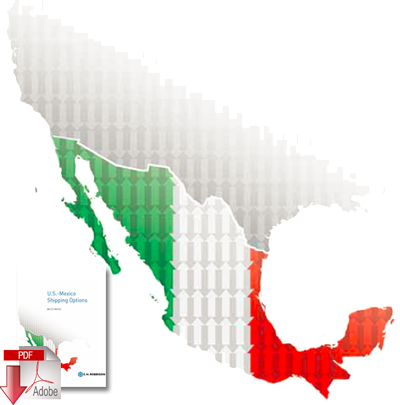Whether your business is inside Mexico or crosses the U.S./Mexico border, logistics experts can help you turn your supply chain into a competitive advantage.
Trust our 25 years of experience on the ground in Mexico to deliver reliable and cost effective solutions for your supply chain.
Gain access to capacity when you need it and the visibility you want to grow your business. Watch this video to find out how our logistics expertise and commitment can contribute to your success in and around Mexico.
It’s easy to understand the importance of routine checkups with medical professionals like doctors and dentists to gauge a body’s health.
Many people have a similar approach with insurance policies or financial investments - annually verifying that the coverage or diversification is still appropriate.
So, why wouldn’t you apply the same rigor to supply chains?
Over the last few months, I’ve spoken with many companies where Mexico is an increasingly important aspect of their supply chain.
These companies typically source key components from Mexico, have increased their investments in Mexico manufacturing facilities, or sell a large percentage of their finished goods to consumers in Mexico.
Several clients expressed concern that the service providers they’ve had in place for years might not be appropriate for the increased role Mexico plays in their current and future supply chain. Capacity strategies are also a hot topic for these organizations.
The already tight trucking market is impacted even further by several factors:
Ratio of northbound to southbound freight
Reluctance of asset based carriers to invest in new equipment
Driver shortage
- Growth in Mexico’s manufacturing sector
If any of this sounds like your organization, it may be time to assess the health of your cross-border strategy and better plan for the future.
7 Tips for Choosing a Cross-Border Truckload Provider
- Flexibility. When a provider offers both direct and transloading services, they’re able to meet service requirements for a larger spectrum of shipper needs.
- Bundled Services. Providers who bundle customs brokerage services with transportation offer single-source accountability for all of your crossborder shipments.
- Capacity. The best providers have developed working relationships with many carriers on both sides of the border to boost your buying power and provide equipment with ease.
- Cross-Border Locations. When difficulties arise, a large, reputable, and experienced provider with employees and offices located on both sides of the border will be located at the heart of the action to represent your interests.
- Improved Security Processes. Idle freight runs the risk of being tampered with. A good cross-border provider will offer measures and processes to decrease idle time and improve freight security, including stringent examination processes and secure drop lots/drop trailers. They can track freight, require that drivers only refuel at approved locations, investigate any unexpected delays, and offer freight escorts.
- Information and Collaboration. Expect your provider to be on your side in continuous improvement, delivering information and reports about every cross-border transaction.
- Consolidation. Your LTL shipments can be combined with other shippers’ partial loads to create full truckloads at the border and produce savings.
Providers
Choosing a provider that is aligned with your growth strategy and discussing expectations before the market tightens or volumes increase is a great way to increase your chances for success. Shippers with an increased reliance on Mexican markets should think about the following:
Are you collaborating with your providers to understand forecasted volumes and commitments?
Have you revisited your modal selection? Is a mode that was previously unavailable to your lanes, like intermodal or consolidation, now a good fit?
- Have you recently investigated crossdocking at the border as a way to access more capacity? Is your provider frequently reevaluating these options?
Customs Brokers
Your customs brokers should be able to demonstrate their quality and value through compliance programs and contingency planning. If yours simply fills out forms, it may be time for a change to a broker that offers both Mexican and U.S. customs brokerage. It can be hard to devote time to contingency planning, but that investment will pay dividends when even a small hiccup occurs in the supply chain.
Mexican customs brokerage licenses are held by individuals, not corporations, and can only operate at a maximum of four ports. Understand the impact on your supply chain if your Mexican customs broker is suddenly unable to operate.
Ask yourself:
Why are you working with your current customs brokers? Are your needs materially different now than they were at the time you started your relationship? Do they provide you with the right tools, resources, and reports to limit your exposure to risk and minimize your total landed costs?
- Do you have a backup provider in place? Setting up a Mexican customs broker takes time; it’s not something you want to initiate with an urgent shipment in transit. Having a backup Mexican customs brokerage license (patente) registered with the government and registering the license to alternate ports you plan to use in the case of an emergency is a strategic move.
If it’s been a while since you physically visited your cross-border providers, an annual checkup might be a great excuse to do so. Walk through their facilities and speak with people face to face, this is a great way to get a feel for the company’s health, direction, and alignment with your goals.
Take the time to verify the services and offerings you’ll need in the coming year and honestly consider if your current providers and brokers can meet your needs. Like a visit to your dentist or financial advisor, identifying a problem before it gets painful is always a good investment.
Related: Changing Customs Rules Will Make Mexico a Trade Force to be Reckoned With

Article topics
Email Sign Up


















